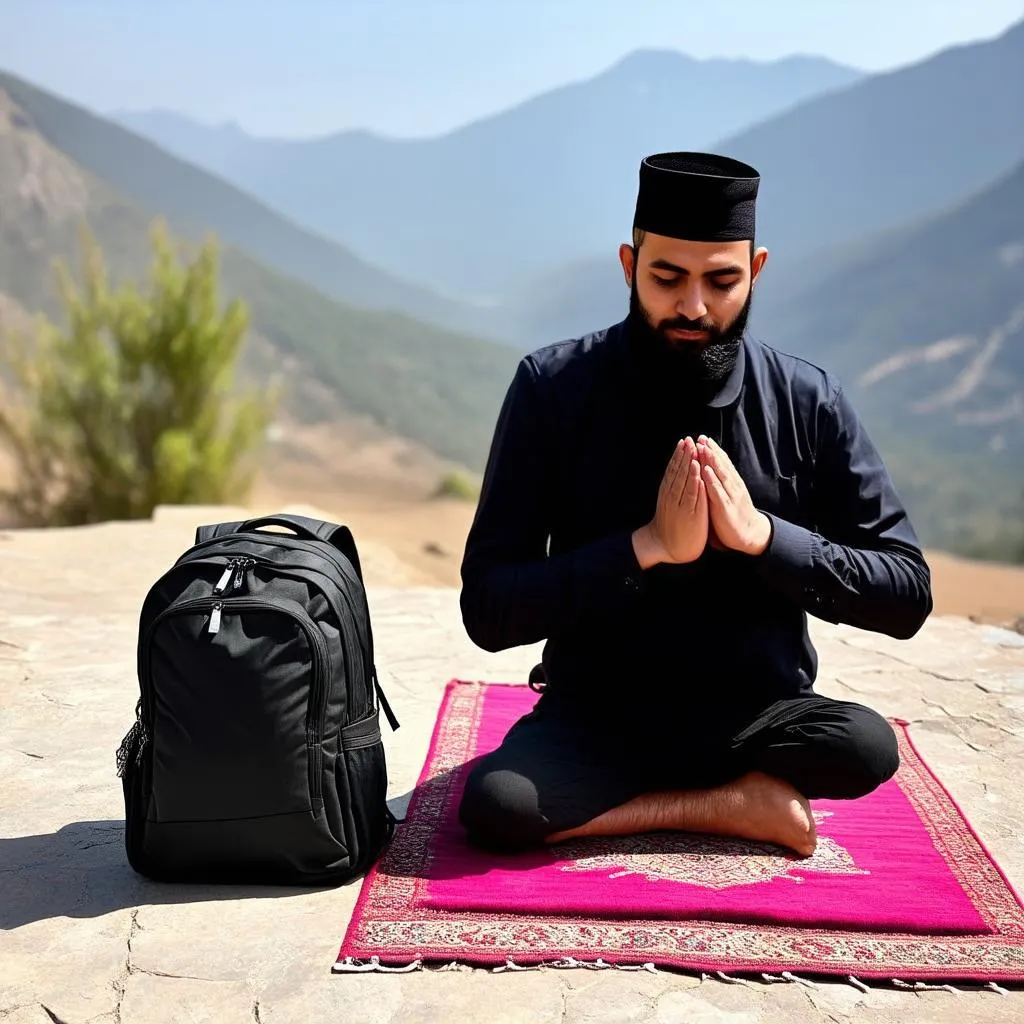Imagine this: You’re standing at the foot of the majestic Eiffel Tower, the sun setting behind it, painting the Parisian sky in hues of orange and purple. As a Muslim traveler, this breathtaking moment is intertwined with the call to prayer. But how do you navigate prayer times and rituals while exploring a new city, let alone a new continent?
Navigating prayer while traveling can feel daunting, but it’s entirely manageable and deeply rewarding. This comprehensive guide is designed to help you stay connected to your faith while embracing the enriching experiences travel offers.
Understanding Prayer Obligations While Traveling
In Islam, prayer is a pillar of the faith, a constant regardless of location. However, Islam offers concessions for travelers to ease the challenges of maintaining this pillar while away from home.
Shortening and Combining Prayers (Qasr and Jama’)
One of the most significant reliefs for Muslim travelers is the allowance to shorten and combine prayers. This means:
- Dhuhr (noon) prayer and Asr (afternoon) prayer can be combined and shortened to two units (rak’ahs) each.
- Maghrib (sunset) prayer is always prayed in its full form of three units.
- Isha’ (night) prayer can be combined with Maghrib but remains at its full length of four units.
Whether you’re exploring the bustling Grand Bazaar in Istanbul or hiking the Inca Trail to Machu Picchu, combining and shortening prayers allows for flexibility without compromising your spiritual obligations.
Did you know? Renowned Islamic scholar Sheikh Muhammad al-Munajjid states, “The traveler may combine Zuhr and ‘Asr at the time of either of them, and Maghrib and ‘Isha’ at the time of either of them.” – Source: IslamQA.info
Finding Prayer Times and Locations
In today’s digitally connected world, finding prayer times and mosques is easier than ever. Numerous apps and websites provide accurate prayer times based on your location.
- Muslim Pro: A popular app with prayer times, a mosque finder, and even an audio Quran.
- IslamicFinder: Another comprehensive app with similar features and a Qibla compass.
Additionally, don’t hesitate to ask locals or fellow travelers for the nearest mosque. Often, even in non-Muslim majority countries, you’ll find mosques or Islamic centers in major cities.
Pro Tip: When visiting attractions, check for designated prayer rooms. Many museums, airports, and even shopping malls now offer these spaces for multi-faith prayer.
Maintaining Ritual Purity (Tahara)
Maintaining ritual purity is essential for prayer. While traveling, this can sometimes pose a challenge. Here are some tips:
- Pack a travel-sized prayer mat and a small bottle for ablution (wudu).
- Wet wipes and hand sanitizers are helpful alternatives when water is scarce.
- Learn the Islamic rulings on dry ablution (tayammum) for situations where water is unavailable.
Remember, Allah understands our limitations, and sincerity in your efforts is paramount.
Planning Your Trip with Prayer in Mind
Incorporating prayer into your travel plans can enhance your experience.
- Research your destination: Identify mosque locations and prayer times in advance.
- Consider traveling during off-peak seasons: This can mean shorter prayer lines and a more tranquil prayer experience.
- Book accommodations with prayer facilities: Some hotels offer in-room prayer rugs or have designated prayer rooms.
Embracing the Spiritual Side of Travel
Travel itself can be a spiritual experience. Embrace the opportunity to connect with your faith in new and profound ways.
- Praying in different environments: Imagine offering your Fajr prayer as the sun rises over the Taj Mahal or your Maghrib prayer with the sound of the waves crashing on the beaches of Bali.
- Meeting Muslims from different cultures: Visiting mosques in different countries allows you to witness the beauty of Islam practiced in diverse ways.
Finding Peace in Prayer While on the Move
 Muslim traveler praying
Muslim traveler praying
Remember, the essence of prayer is connecting with the Divine. Even if your prayer space is a quiet corner in an airport or a park bench overlooking a bustling city, the sincerity of your intention is what matters most.
Don’t forget: Travelcar.edu.vn offers a wealth of resources for Muslim travelers, including articles on “How long can you combine prayers while traveling?” and “How to pray Zuhr and Asr together when traveling.”
FAQs About Praying While Traveling
1. Can I pray on a plane?
Yes, you can pray on a plane. If space allows, discreetly stand and face the Qibla. Many airlines also provide information on Qibla direction during flights.
2. What if I miss a prayer while traveling?
If you miss a prayer due to travel constraints, make it up as soon as possible. Remember, Allah is Most Merciful and understands our limitations.
3. Can I shorten my prayers even if I’m not traveling far?
The permissibility of shortening prayers depends on specific conditions and distances outlined in Islamic jurisprudence. Consult with a knowledgeable scholar for specific guidance.
Conclusion
Integrating prayer into your travel plans might require a little more planning and awareness, but the spiritual rewards are immense. By embracing the flexibility and concessions Islam offers, you can embark on enriching journeys while staying connected to your faith. Remember, the world is a vast and beautiful masjid (place of prostration), and every new experience is an opportunity to deepen your connection with the Divine.
Do you have any other questions about prayer while traveling? Share your thoughts and experiences in the comments below!